A book titled ‘All Roads Lead North: Nepal’s Turn to China’ by Amish Raj Mulmi includes a passage that highlights the inclination between the two neighboring countries for a few years now.
Mulmi is a prolific Nepali writer and this book, his first, contains his personal experience.
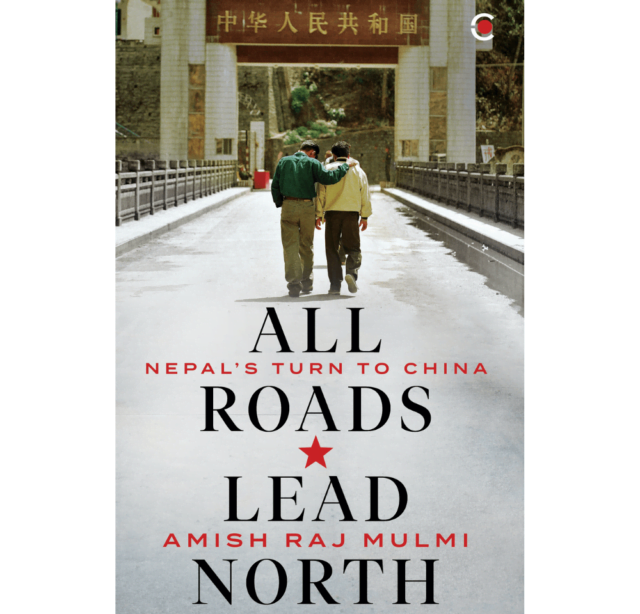
I have simplified certain excerpts from the same to help you understand the context better.
The Rasuwa–Gyirong border
Rasuwa Fort or Rasuwa Gadhi is a historical fort ruin in the Rasuwa District of Nepal roughly at the border with Tibet, China. It has been commonly called ‘Resoqiao’ or ‘Iron Chains Bridge’ from the times of 1792 by the Chinese.
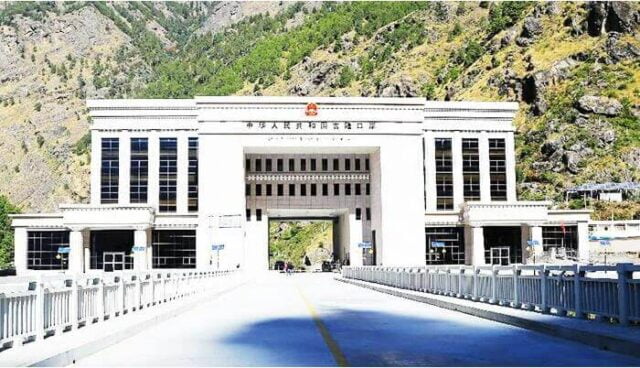
Gorkhali soldiers strived hard to hold off the Qings in a battle that lasted 3 days in the same arena and after being hit by an earthquake in 2015, the Nepal Army reconstructed the fort walls.

Since earthquakes are always accompanied by vast ruin, the same applied here and the delicate geology of the arena shifted towards instability. In Nepal, landslides too are, as commonly sighted as earthquakes.
A memorial stands erected on the Timure ground, commemorating the lives of 9 people who succumbed to the landslides of 2018. But the expectations from this land remain unaffected.
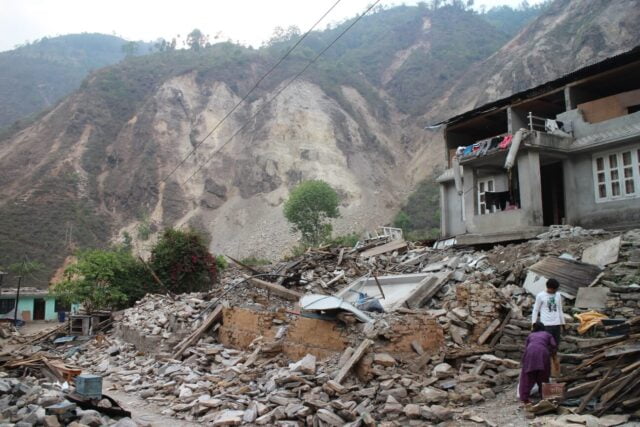
Read More: Why Was Nepal Never Invaded By The Mughals?
Chinese Companies At Work
Thanks to the cost of the land that has risen above and beyond because of the scope of a dry port (inland intermodal terminal directly connecting land to the seaport, serving as a center for transshipment), the Chinese government-owned Tibet Fuli Construction Group Company Limited, has planned to invest 124 million RMB on it.
After building here, the company plans to hand it over to Nepal. Not far from here, a hydropower project has been taken up by China International Water and Electric Corporation of about 110 MW.
Also at Rasuwagadhi, at the point where Lende River meets the Gyirong Zangbo waters, a makeshift bridge stands to help transport, after the calamitous quakes. Talks are undergoing to replace it with a new ‘friendship’ bridge as suggested by the Chinese.
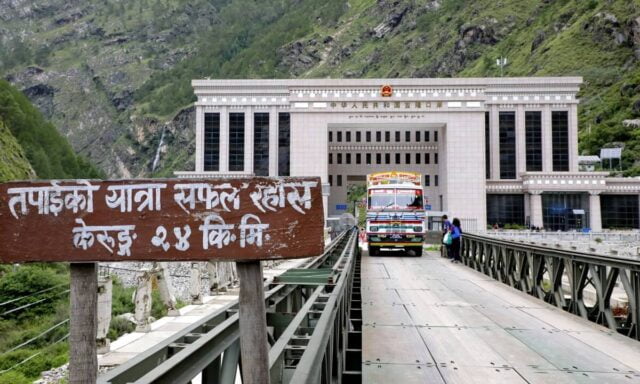
Not a day passes by when the sounds of drills, excavators, and bulldozers escape the notice of the nearby residents. Dust too remains a significant aspect of their lives.
For kilometers at a stretch, trucks queue up to cross the border to China. This queue varies from a few hours to a few days.
Crossing The Border And Looking At The Contrasts
Crossing the border brings forth a stark contrast between the two countries. On the one hand, dust envelopes the lands of Nepal, while on the other, Chinese lands have orderly fashioned, concrete buildings.
The immigration center and cargo terminal in Nepal feel haphazard and old, although they got rebuilt after the quakes, while the ones on the other side of the border are two-floored buildings that stand tall and proud.
After all, “The Chinese can build whatever they want to build.”
Under the legit stated reason, Nepalese enter the foreign lands, all the time assisted by a Nepali official. Proper documentation is required for entering the lands of this mystifying country.
Nepalese are lined up and a picture is taken and an unsaid rule remains, they will have to return together lest detention is what they want. Any Nepali citizen can be spotted from a distance. The Chinese behave in a very orderly and fancy manner.
Nepal’s rugged hills get outshined by China’s engineered structures, rural markets lose their luster when these urban complexes come into the picture.
The Rasuwa–Gyirong border crossing was the only dry port between Nepal and China between 2015 and 2019, but the opening of the Tatopani–Zhangmu (closer to Kathmandu) crossing after 4 years proved beneficial.
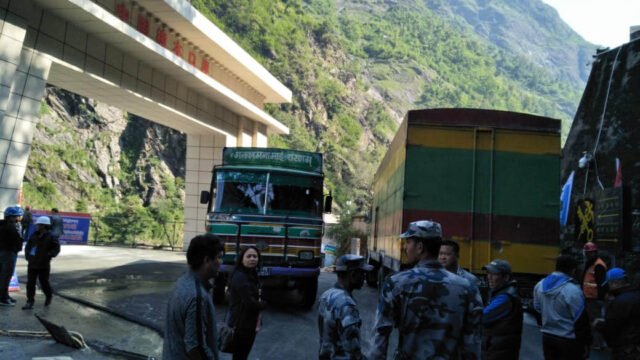
‘The Tatopani truck owners are ready to ferry goods for NPR 75,000–80,000 per trip because they do at least two to three trips per month. But Rasuwa locals have been demanding at least NPR 110,000 per trip,’ said a local, hinting at the increase due to the revenue collected that exceeded the target by 26%.
Almost every daily commodity is a steal in China. As opposed to the huge cost prices in Nepal, shopping in China is much cheaper and easier.
On returning, the people in the pre-taken photograph line up in the same order and after being closely assessed by the official on duty, get allowed their journey back home.
Returning Abode
While officials in China had welcomed them, Nepal only had dust and barren land to offer. Hired by the Nepal Army to bring back ammonium nitrate for explosives from Gyirong, trucks lined up the roads.
Overall, a sense of deep-rooted connectivity and interdependency overrides the sullen feeling of streaking contrast between two neighbors. Trade too flourishes despite the tense relations with some of the other neighbors.
Image Source: Google Images
Sources: The Wire, Economic Times, Lonely Planet
Find The Blogger: @evidenceofmine
This post is tagged under: Nepal, China, border, Nepal China border, All Roads Lead North, book, book on Nepal China, Amish Raj Mulmi, Nepali writer, Rasuwa Gyirong border, Rasuwa fort, Rasuwa Gadhi, Nepal fort, Tibet, Tibet in China, Resoqiao, Iron Chains Bridge, 1792 war, Nepalese, Chinese, Gorkha regiment, Gorkhali soldiers, Gorkhali army, Qings, Qings of China, Nepal army, China army, Nepal earthquake, 2015 earthquakes, Nepal landslides, Timure, 2018 landslides, 2018 landslides in Nepal, dry port, Chinese government, Nepalese government, Nepal Government, China Government, Tibet Fuli Construction Group Company Limited, RMB, hydropower project, China International Water And Electric Corporation, Lende river, Gyirong Zangbo, friendship bridge, Chinese friendship bridge, cross border, cross Nepal China border, Immigration center, Immigration center Nepal, Immigration center China, cargo terminal, cargo terminal Nepal, cargo terminal China, documentation, foreign land, personal account, experience, border experience, Nepal China border personal account, Nepal China border experience, Nepalese citizen, Chinese citizen, Tatopani Zhangmu border, Kathmandu, Kathmandu Nepal, NPR, Nepal revenue, explosives, explosives in Nepal, explosives in China, how is the other side of the border, what is the process of crossing the Nepal China border, what happens at the Nepal China border, can we visit China from Nepal
Other Recommendations:
Has China Ever Attacked Myanmar And Wanted Its Territory Like They Keep Wanting India’s?
































This author is stupid because there is no Nepal-China border. Nepal borders Tibet which is illegally occupied by the People’s Republic of China government.